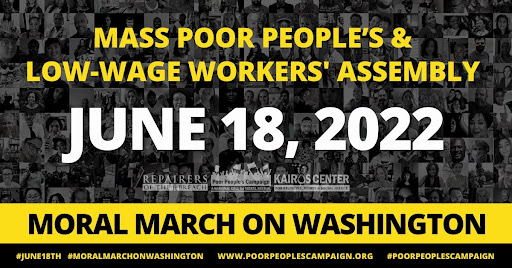Reflections on Kairos Survival Summit #2: The Right to Housing
By Tony Eskridge
On December 9th, the Kairos Center hosted its second Survival Summit on the Right to Housing. The name of the series is a reference to the 1989 “Up and Out of Poverty NOW!” Survival Summit that was organized by the National Welfare Rights Union, National Union of the Homeless and the Anti-Hunger Coalition to connect emergent efforts around housing, welfare and food security and build up their collective power. This is the lineage and history of the Kairos Center that we carry forward today in this current series, where we highlight key struggles and issues facing the nation’s 140 million poor and low-wealth people in this country.
This summit was the second in a series focusing on how people are surviving during and after the COVID-19 global pandemic.
The Eviction Avalanche of 2022
Dr. Chris Caruso, who has been an organizer, scholar and educator for more than 30 years, shared with us why this moment is more than a crisis.
In 2021, median rent and average mortgage payments have risen 20%. This occurred during a pandemic which spurred widespread unemployment for millions of families. When folks were forced back to work, many were still earning poverty wages. Despite the rising costs of housing, food, education, healthcare, and childcare, the federal minimum wage has not increased in 50 years when adjusted for inflation and is currently at $7.25 per hour. The US Census reported that 8.4 million families were behind on rent at the end of 2021, and the Urban Institute reported that 2.6 million rental households were at risk of eviction without aid. Indeed, most of the $46 billion allocated to help renters facing eviction was never dolled out.
Chris and others are calling this Eviction Avalanche. It isn’t being televised, and the national media isn’t talking about it, but it is here, and low-income Americans are feeling its effects every day. According to Princeton University’s Eviction Lab, landlords have filed for 720,000 evictions during the pandemic alone, in just the cities and states they collect data from. Inexplicably, there is no federal eviction database and one-third of US counties do not record eviction data of any kind.
Despite this widespread and growing housing insecurity, on September 30, 2021, the Supreme Court ended the federal eviction moratorium, leaving millions at risk of becoming homeless. In the landlord-tenant courts, tenants are almost always underrepresented, and landlords win an overwhelming majority of the time.
This is yet another unnecessary crisis. As Chris shared, “There’s more empty housing units than there are people experiencing homelessness right now. The means are at hand to solve this crisis. This is not an irresolvable problem. What’s lacking is the political will, and the only way to build that will is by building social movements from the bottom up.”
The Legacy of the National Union of the Homeless
In the 1980’s, in the midst of widespread destruction of public housing, President Reagan pushing the narrative that the poor were lazy, and growing policies that criminalized homelessness, the National Union of the Homeless (NUH) emerged as an organization that could unite the poor and build the social movement Chris was talking about. The NUH exposed these lies and created an effective model of organizing that we are still learning from today. At their height, the original NUH had 30,000 members across 25 US cities.
Phil Wilder, a leader with Put People First! PA and a decades-long organizer of the poor, was a member of the original NUH. During the summit, he shared reflections on the growth of the NUH and their gathering in Philadelphia in May 1989, the Up and Out of Poverty Now Coalition:
“[The Up and Out of Poverty Now Coalition] was a historic gathering. It facilitated the coming together of leaders of various sectors of the poor in fronts of struggle, the homeless and welfare recipients from various regions of the country, and importantly, the US staff of the National anti hunger coalition. A rallying cry of that summit was: ‘We’ve got to fight for the right to live.’”
The NUH is part of a legacy of organizations engaging in projects of survival, which operate with the belief that structural change, not charity, will solve society’s problems. These projects are organized around the immediate needs of the poor to ensure their survival, while making space to politicize their conditions and mobilize to take action. NUH leaders organized projects of survival in the form of housing takeovers all across the country.
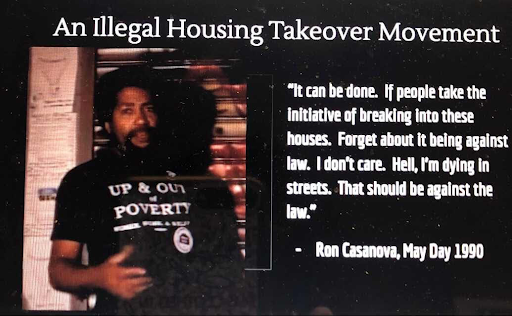
As Phil described: “The Philadelphia Delaware Valley Union of the Homeless, after its studies of the conditions and reality of homelessness in which it found itself, decided to make a very strategic move, which was to politicize and organize the spontaneous housing takeovers and movements of survival that spread across Philadelphia. The housing union was, in essence, an illegal civil disobedience housing takeover movement.
“In 1990, on May Day, in the midst of the National Union of the Homeless’ national housing takeover campaign, Ron Casanova, a leader of the Tompkins Square Park tent city, stood in front of the takeover house and said, ‘[A takeover] can be done, if people take the initiative of breaking into these houses. Forget about it being against the law. I don’t care. Hell, I’m dying in the streets. That should be against the law!’
“Lucy, a comrade of his with the Philadelphia Delaware Valley Union of the Homeless, a few days earlier was sitting inside a takeover house from which she and others were planning their next housing takeover and said, ‘It made more sense to take this house that was empty than to walk around the streets sick and cold.’”
Moral Reframing – Mary the Poor Revolutionary Mother
Aaron Scott is an organizer with Chaplains on the Harbor in Grays Harbor County, Washington State. Grays Harbor County was the timber wood capital of the world until the 1990’s, when the industry moved to the Global South. Following that move, and without any replacement for that industry, the county witnessed an expansion of local jails, municipal jails, and the construction of a state prison. As a result, there has also been an expansion in the number of people growing up in economic freefall or living on the street. In 2021, Grays Harbor County saw a fourfold increase in overdose deaths. Aaron shared the tragic story of his friend, Greg Sanchez, who died of an overdose days before the Summit.
In his remarks, Aaron reminded us of the poor, revolutionary mother of Jesus, Mary. He spoke to recent archeological findings in the area that would have historically been the city of Nazareth at the time of Jesus’ life. There, archeologists found that many of the basements of the ancient homes in this area possessed a hidden network of tunnels and pits, burrowing deeper into the ground and connecting adjacent pits to each other. We know from historical record and from the written record in the Bible that the tyrannical Roman Empire overtaxed, over-policed, and had no regard for the lives of the poor Jews. There was no way for the Jews to live off of what the Romans left them. These basements and pit networks served as spaces for hiding those who were being terrorized by the Roman Empire and to engage in community-wide tax evasion.
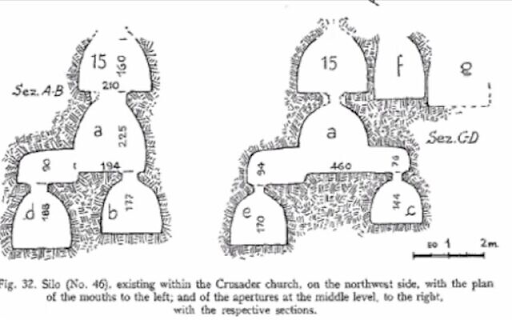
According to Aaron, Mary was at the center of this ancient project of survival. “Under the Basilica of the Annunciation, the site where people say the angel Gabriel came and spoke to Mary, was Mary’s and her parents’ house. And [her house] appears to be the epicenter of this underground hive. It is the deepest, largest, most extensive pit network and connects to everybody else’s. It’s hard to know exactly what that means, but God, in deciding where [Jesus] is going to be born on Earth, looks at Nazareth, looks at this town where everybody is so poor they have to steal to survive. And God looks not only at that specific town, but looks at who is the kingpin or the queenpin of this underground economy. He looks at the queen bee of this hive and says, ‘that’s where I’m going. This is where I am going to show up in the world.’”
Indeed, Mary was a poor woman, and just as she, Jesus, and his disciples were called to organize a movement to establish justice on Earth, we too are called to the movement to establish justice today.
The Fight for the Right to Housing
During the Summit, a panel of organizers, researchers and policy experts shared lessons, challenges, and breakthroughs on how the right to housing and the movement to end poverty are growing today.
Denita Jones is an organizer with the Texas PPC. In 2021, the City Council of Austin voted to ban encampments – fining and arresting people who, as a last resort, are living on the streets. Denita described the challenges of working with organizations that were not interested in ending this crisis: “In Texas we have an abundance of homeless networks and non-profits. To my dismay, most of these organizations are more for patting themselves on the back than really organizing the dispossessed and the unhoused.”
She continued, “If these large organizations are not committed to systemic change, despite their recognition in the mainstream, it is okay to not align ourselves with them – we can build real power without conceding our demands.” Denita also shared how homeless and formerly unhoused people were lead organizers of their work in Austin. Denita says when the poor lead organizing efforts, it gives them a sense of pride, a sense of ownership, that they can make a difference in their situation when the dominant narrative portrays them as helpless.
Peter Kinoy is the coordinator for Media with the New York State Poor People’s Campaign and has been in this fight for decades. His main lesson was to “change the narrative by changing the narrator.” In 1991, he helped film and produce the documentary Takeover, which chronicles the story of National Union of the Homeless’ political activity and civil disobedience, shared in the union members’ own words.
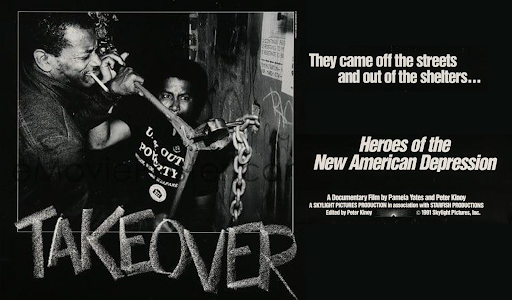
Peter and the New York Poor People’s Campaign partnered with the Rochester Homeless Union to produce media projects that tell the story of the struggle and the Union’s successes. Sabine Adler, an organizer for the Rochester Homeless Union and collaborator on these projects, said how important it is for this messaging to reach the base of people who are struggling to survive on the streets. “We need to make make media to speak to our people, and do it in an honest way.”
Two films came out of this collaboration: The Road We’re On looks at the life and organizing of Patrick Braswell, an anchor in the Rochester homeless community who passed away in 2020; and Take Back the Cadillac documents the campaign to reclaim the Hotel Cadillac, once a short- and long-term housing option for the poor that is now vacant and rezoned for luxury development in a heavily gentrified neighborhood. Using a laptop or projector, the Union would show their films in shelters and encampments to get people to learn about their mission and get organized. Peter and Sabine’s videos have been used as political education in other homeless unions around the country.
Grace White is a Homes Guarantee Organizer for People’s Action. The Homes Guarantee campaign is led by poor and working class tenants, the unhoused, public housing residents, renters, and poor homeowners. Grace believes the tenant movement is stronger than ever before: “The eviction crisis has led to the organization of an unprecedented number of tenants who are taking bold action against the systems that harm them.”
At the same time, she knows that narrative campaigns are not enough. Grace spoke to direct actions taken by tenants that have delayed hundreds, if not thousands, of evictions. In Kansas City on a weekly basis, tenants would chain the courthouse doors shut, preventing eviction hearings from happening. Tenants would also verbally disrupt Zoom eviction hearings. These organizations were clear about the power they possessed and were led by tenants, themselves.
These actions created openings for more people to join and become part of this organizing effort and resulted in meaningful wins. However, bold demands for rent and mortgage cancellations were not won, in part because corporate landlords are still too powerful. Grace spoke to how these landlords will continue to consolidate their power as small landlords and property owners face foreclosure following their pandemic losses. As she said, we need a national movement to contend with that kind of power.
Estevan Hernandez is organizing in Georgia with the Party of Socialism and Liberation around mutual aid in the housing struggle and rent strike. Estevan shared that we need to tie the local struggles to the city, state, and national struggles. Locally, their fight was with the Department of Community Affairs, which was not distributing federal rental assistance money.
Estevan’s group gathered tenants in Atlanta around this fight and connected it to the national efforts to increase housing assistance. Georgia’s slow government process was a challenge, so organizers had to choose their battles. In Atlanta, they decided it not to help people apply for this assistance, because of the backlog and slow process. However, in Athens, those with pending applications for assistance could not be evicted, so helping low-income renters apply in this city saved many of them from eviction.
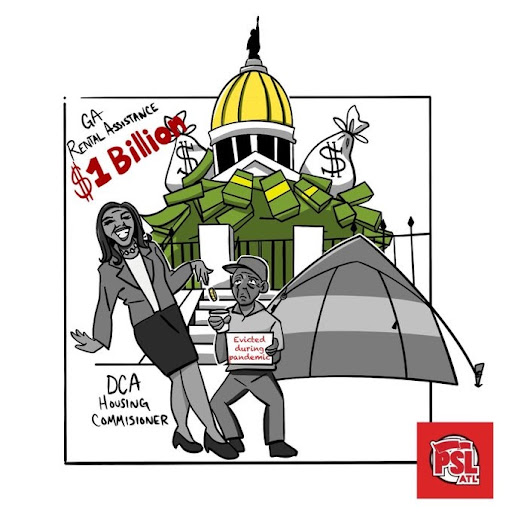
Eric Tars is the Legal Director at the National Homelessness Law Center. His message was clear: Housing is a human right, and all of our organizing and all of our demands must be rooted in this belief.
“Because housing is a human right, we need the eviction moratorium during the pandemic. We need the Build Back Better Act to repair our crumbling public housing infrastructure and fund more vouchers. We need anti-racist policies that will equitably serve BIPOC communities and undo the legacies of white supremacy in housing markets.”
We have been digging ourselves into an affordable housing crisis since the 80’s, when Reagan painted the poor and welfare recipients as lazy. When people see visible homelessness, the right wing knows how to exploit this. Instead of blaming systems, they blame the individuals for their own homelessness and criminalize their existence, pushing them out of public view. Policing the homeless costs us 2-3 times more than providing housing.
Eric said we also have to pay attention to co-optation of “the right to housing” messaging. The Sacramento Mayor introduced a proposal: “Right to Housing and Obligation to Use It,” and it serves as basis to criminalize encampments under the pretense that “other options exist.” We have to not only say housing is a human right, but we have to say what that does and does not look like.
Anthony Prince is the lead organizer for the revived National Union of the Homeless and the California Union of the Homeless. The revived NUH is organizing in 10 states, with many local chapters in those states. In California alone, there are 25 local chapters and membership varies from one chapter to another by the tens, hundreds, and thousands.
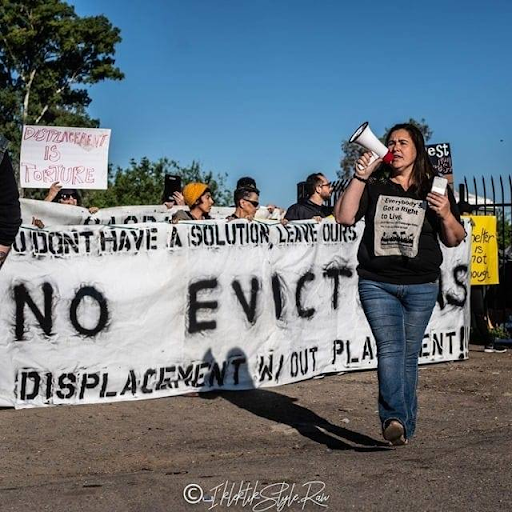
Anthony reminded us that while charitable efforts can offer short-term relief, they aren’t enough to end homelessness:
“The difference between charity and solidarity is that the Salvation Army can give out a sleeping bag, but [the homeless union] can distribute the same sleeping bag and say, here’s a place for you to get sleep tonight, so tomorrow morning you can come to the homeless union and organize yourself in order to get substantive, systemic change.”
Anthony also echoed what other panelists said: sometimes the poor are not even aware of what they deserve because the dominant narrative around poverty is so strong, and charity frames the poor as helpless. When the union engages in actions, their members build up their self-worth and strengthen their resolve.
We Cry for Justice in June 2022
Our movement is growing, and leaders are rising around the country to meet this moment. Savina Martin, the president of the original Boston Union of the Homeless, compares the revolutionary power growing in America to Mary the revolutionary mother:
“There are many Marys, the 140 million Marys. Those who stand in soup lines. I reflect on mothers that have lost their sons to police violence, and their plight and fight becomes such a danger. We must become a tool while organizing. What does God call on through Mary’s Song? It became a call to action. So let us gear up once again, as tired as we may be, to mobilize this coming year to a massive level into Washington DC with the Poor People’s Campaign’s Assembly on June 18, 2022, at the seat of the citadel, to sing our song for life, our song for liberty, and our song for the pursuit of justice and to live and not die in the richest country in the world. We Cry Justice!”
The dominant narrative wants to blame the poor and the homeless for their problems, but we know the truth. We know the poor are working, sometimes two or three jobs, just to be paid starvation wages and still not have enough for basic needs.
This is why we demand the funneling of resources to turn vacant buildings into affordable housing. We demand the raising of the minimum wage to a housing wage – $24.90 is the national housing wage for a 2-bedroom home. We demand an end to all evictions. We demand the cancellation of all debt that is suffocating the 140 million low-wealth Americans. We demand an end to mass incarceration and a restructure of the economy to choose people over prisons.
And on June 18, 2022, the Poor People’s Campaign: A National Call for Moral Revival will mobilize a massive poor and low-wage worker’s assembly in Washington DC to demand our government take action. The lie that we do not have the resources to end poverty and homelessness has gone on far too long, and we won’t be silent anymore.
